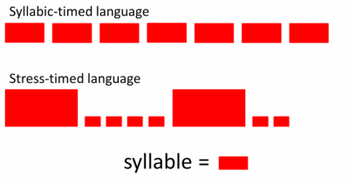“Oh, Karen. Stress makes me so stressed!” That’s what one of my Korean clients told me after we worked on her English pronunciation. The stress she was talking about was syllable stress. Why is syllable stress so important (and sometimes stressful!) for Korean speakers of English? Let’s explore ... The Rhythm of American English versus the Rhythm of Korean What is rhythm in language? Rhythm is the timing patterns among syllables. A syllable is a word, or part of a word, with a vowel sound. For example: Pass has 1 syllable because it has 1 vowel sound. Password has 2 syllables. Different languages have different syllable patterns. Putting these patterns into exact categories is not so simple, but in essence, there are two rhythms: syllable-timed and stress-timed.
Korean is a syllable-timed language. The syllables are spoken with equal length. For example, the word "banana" is pronounced with equal stress: ba-na-na. In contrast, English is a stress-timed language. English alternates between stressed and unstressed syllables. Some syllables are longer. Some syllables are shorter. In the word "banana", the middle syllable is stressed: ba-nA-na. We do not say all three syllables equally, as Korean speakers tend to do. Here’s a simple illustration that I show my Korean-speaking clients to make the difference clear: As you can see, Korean and English have very different rhythms. If you use the rhythm of one language to speak the other, that contributes to your accent. In other words, accents are not exclusively due to the pronunciation of individual sounds (vowels and consonants.) Rhythm plays an equally important part.
If you do not stress a syllable, or if you stress the wrong syllable, your English becomes difficult to understand. This can leave your listener frustrated, which is clearly not your goal. An example: You are making a presentation, and you say ... Our sales increased drAm-a-tic-ly Your audience may be confused. Why? The word should be pronounced dra-mA-tic-ly. Please remember, it goes both ways. Americans who learn Korean as adults will want to use the stress-based rhythm of their native tongue. And this impacts how hard their listeners have to work to make sense of the Korean that they are hearing when spoken by an American. On a recent trip to Korea, I tried to learn a few phrases. As an American English speaker, it’s very hard for me to say kamsahamnida (thank you) without stressing a least one or two of the syllables. Even a simple word like umma (mom) is a challenge for me: I desperately want to say Um-a, like the actress Uma Thurman, who is definitely not my umma! What about the individual sounds? Aren’t they important to clear English? It’s true. There are several individual sounds in English that are challenging for Korean speakers: the L, R, Q and W, for example. In addition, sometimes Korean speakers of English will insert an extra syllable at the end of words (bus is pronounced bus-u) or between consonant clusters (skirt is pronounced suh-kirt.) These pronunciation errors do affect your intelligibility (your listener’s ability to understand you easily), but not as much as you might think. With context, I will have no trouble understanding whether you are talking about the importance of human rights or human lights. Probably, you mean the first one – human rights! What’s more, changing individual sounds is an extremely time-consuming process. Most of my clients are busy, working professionals. They have jobs and families and very little time for the repetitive practice needed to change individual sounds in their spontaneous speech. In fact, many of my clients are relieved to learn that they don’t have to completely change how they are pronouncing individual English sounds. I mean, who has the time!? So what should a busy professional do to improve their American English pronunciation? I suggest working on the rhythm, or what I like to call the “music”, of American English. In addition to syllables stress, the “Music of English” includes key word stress (the most important word or words in a sentence) and pausing in logical places. To be clear, my clients from Korea speak English at a high-intermediate to advanced level. I am not talking about lower-level English learners. Vowel and consonant pronunciation is critically important to speaking English clearly. But for higher-level English speakers with limited time, try improving the “music” of your English. This will provide you with the best and fastest path to speaking English more clearly and confidently. Are You Ready to Work on the Music of English? “The Music of English” is one of Well Said Coaching's most popular packages. In just a short amount of time -- typically five to eight lessons -- we teach you the essential elements of this music. Plus, you receive plenty of practice. If you’re interested to learn more, please check out our pronunciation lessons, and then schedule a free consultation. We look forward to helping you improve your English dra-mA-tic-ly. Comments are closed.
|
AuthorTips and tidbits about speaking English well from Karen Schiff, founder of Well Said Coaching. Archives
February 2024
Categories
All
|


 RSS Feed
RSS Feed
